If you’re considering gastric bypass surgery, or you’ve recently had the procedure, you may be wondering how much weight you’ll lose and how long it will take. Keep reading for more information to help you set realistic goals for your weight loss journey.
What is the gastric bypass?
The gastric bypass procedure, or Roux-en-Y gastric bypass (RYGB), is one of five bariatric surgery techniques.
Gastric bypass reduces the stomach size to hold about one ounce of food or liquids. The small intestine is then divided to separate the upper and lower parts, known as the duodenum and the jejunum. The new stomach pouch is attached to the lower portion of the small intestine, or jejunum, while the upper portion of the small intestine, or duodenum, is connected further down the small intestine.
Two new connections are made during this procedure. One from the new stomach to the lower small intestine, and another from the upper small intestine to the lower small intestine.
How does it work?
Gastric bypass is effective for weight loss in several ways. Like many bariatric procedures, the newly created stomach pouch is smaller and cannot hold as much food, which means fewer calories are consumed. Additionally, the food does not move through the first portion of the small bowel which results in decreased absorption. Most importantly, the physical alteration of the food path through digestion significantly affects hunger, and fullness, and allows the body to reach and maintain a healthy weight.
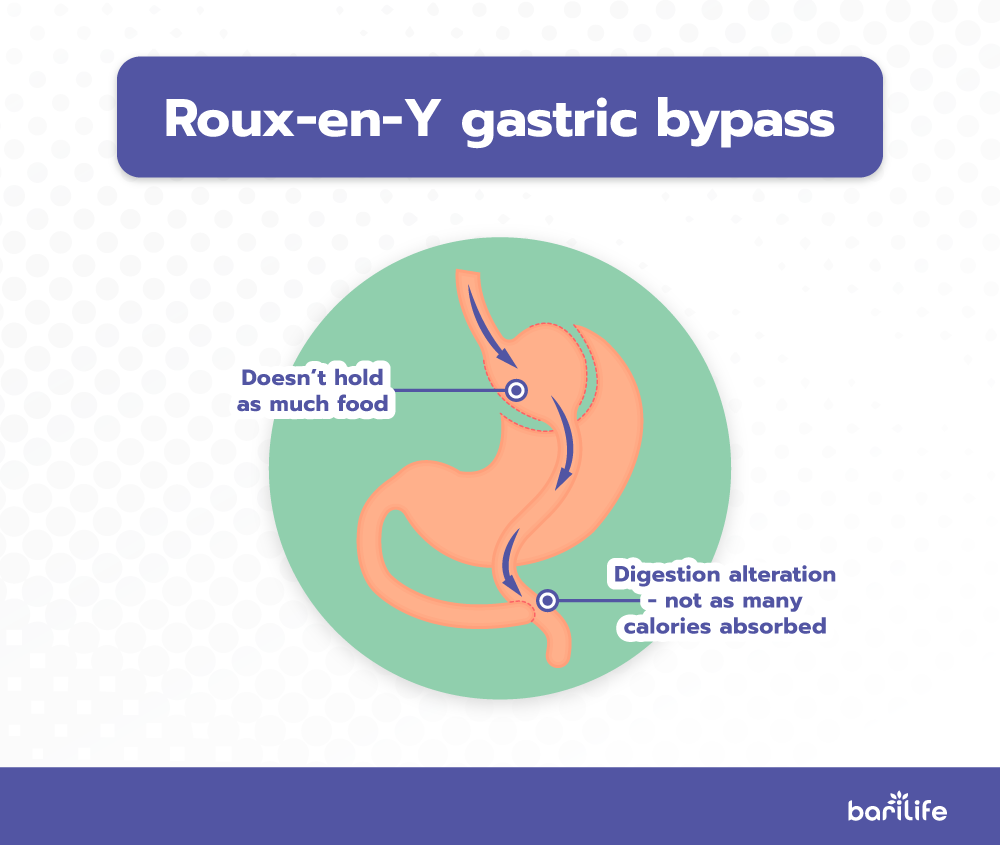
Average weight loss with gastric bypass
You should know that “weight loss” for any bariatric surgery normally refers to the “excess” body weight that you should expect to lose. The average gastric bypass weight loss is about 70 percent of excess body weight within one year of having the surgery.
In bariatric medicine, the term that is often used is Excess Weight Loss (EWL). EWL is defined as your current body weight minus your “Ideal Body Weight.” EWL provides context to the relationship between current weight and “ideal weight,” or your goal weight.
For example:
Excess Weight = Current Weight – Ideal Weight
Excess Weight = 230 lbs – 128lbs
TOTAL Excess Weight = 102lbs
For this person, they could expect to lose about 70% of 102 lbs, or 71 lbs by the end of the first year.
Gastric bypass weight loss chart
A gastric bypass weight loss chart can help illustrate the weight loss progress you can expect to see at several time intervals post-surgery. It is important to set realistic expectations about your gastric bypass weight loss timeline. You should ask your bariatric surgeon lots of questions during your pre-op consultation to get a clear picture of your estimated weight loss over time.
Set Short-Term Goals and Monitor Progress
The purpose of the gastric bypass surgery weight loss chart is to help you set short-term goals and monitor your individual progress. Each patient is unique with different metabolisms and health conditions. Gastric bypass results will vary from person to person, so focus on your own goals and weight-loss. Don’t feel discouraged if your weight loss is slightly different from your goals because they are based on average figures.
Variable Rate of Weight Loss
One important thing to keep in mind is that over time, your weight loss will slow. This is normal and to be expected. In the first few weeks, you can expect rapid weight loss because you will start on a post-operative liquid diet. People lose on average about 17 percent of their excess weight within the first month (this statistic is taken directly from Dr. Boyce’s practice and working with thousands of patients). As your diet is liberalized and your eating is normalized, the rate of weight loss will progressively decrease.
Gastric bypass weight loss milestones
Many studies done on gastric bypass outcomes have provided data to help determine how much weight one can expect to lose based on a certain timeline. These figures are estimates and are not exact. They should be used as a guide to help you set short-term and long-term goals after gastric bypass surgery.
One month after having gastric bypass surgery, you can expect to lose about 17 percent of your excess body weight. At 3 months, patients lose on average between 25-35% of their excess body weight. Patients should lose about 45-55% by the 6 month mark. A year after gastric bypass, if you are consistent with your diet and physical activity, you should lose around 60-70% of your excess body weight. By 18 months, some patients successfully lose 75-85% of their excess body weight.
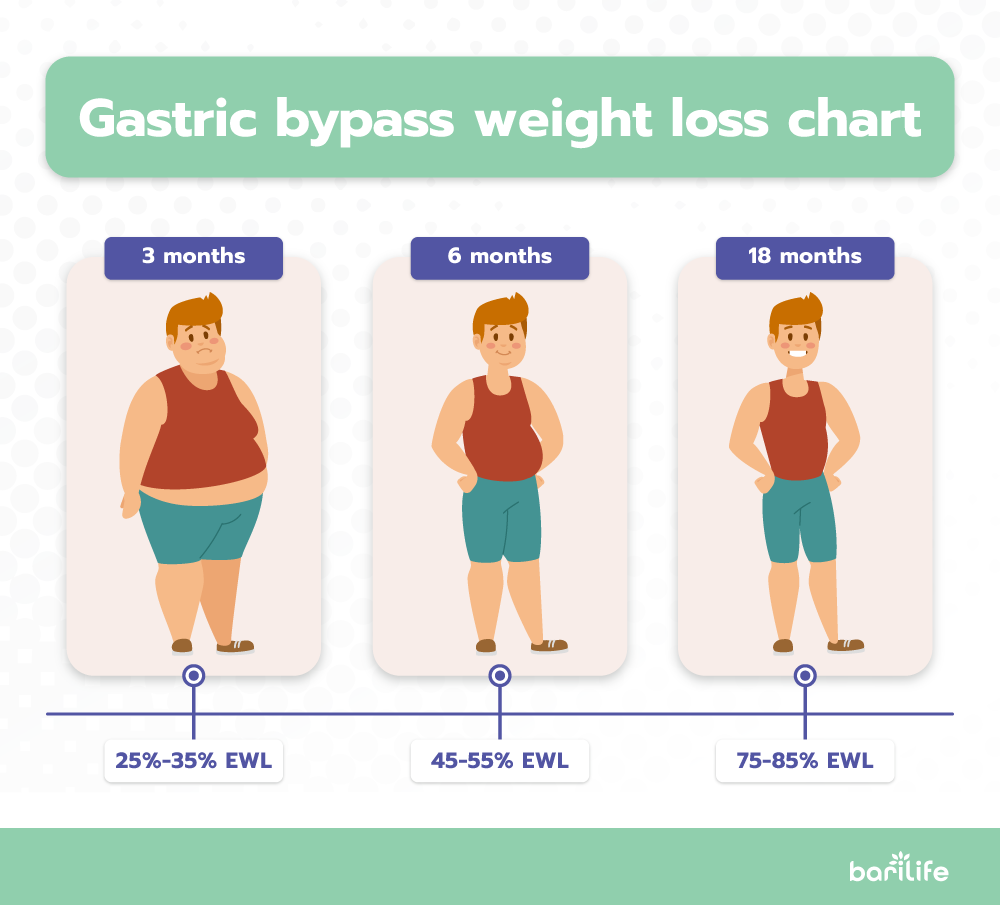
Gastric Bypass Weight Loss Calculator
This calculator will estimate how much of your Excess Weight Loss (EWL) you can expect with each bariatric surgery option.
This is a good first step in evaluating your bariatric surgery options, or comparing your personal weight loss progress against the average.
What causes slow weight loss after gastric bypass
Immediately following gastric bypass surgery, there are several things that contribute to rapid weight loss:
- Reduced appetite – after gastric bypass, people generally aren’t hungry, so calorie intake is very low
- Gradually liberalized 4-phase diet – the first phase of the post-op diet is only liquids, and is the most calorie-restricted phase of the diet
- Motivation is highest in the beginning – people are often most motivated to make changes at the start of a new weight loss journey
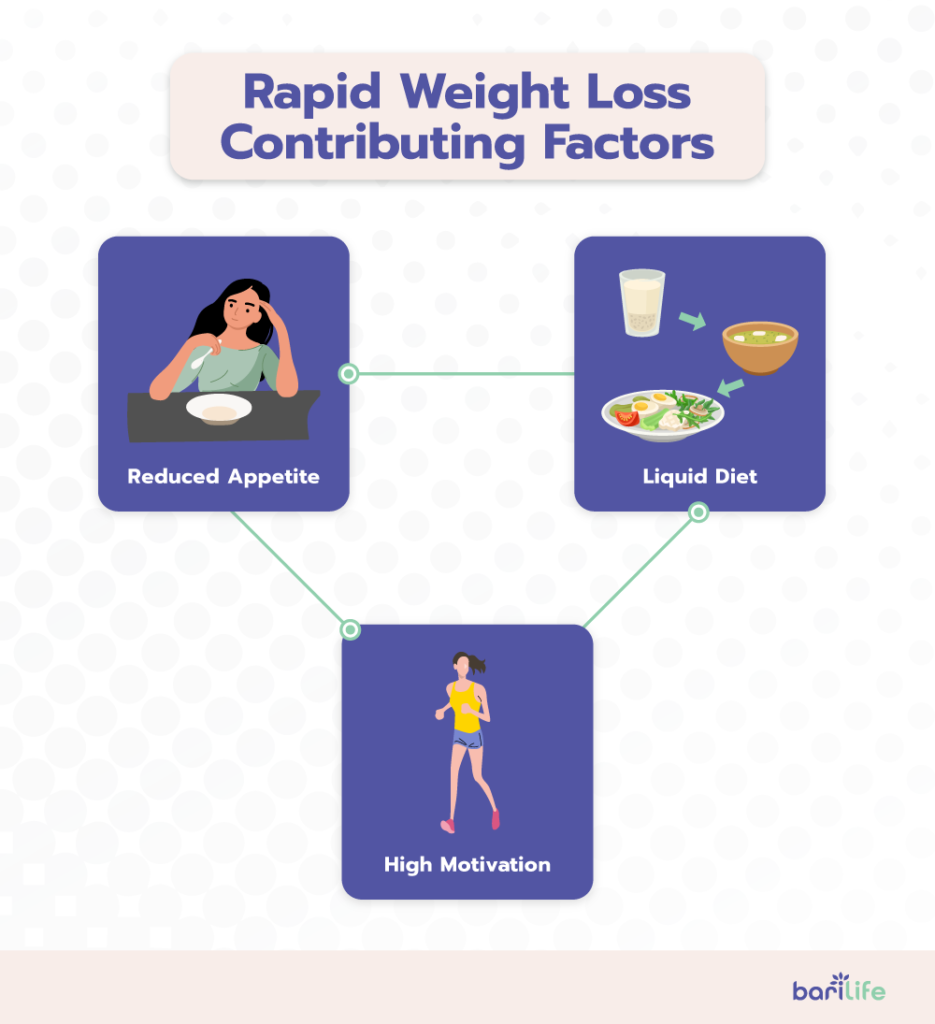
Most patients will continue to lose weight fairly easily for about 6 months following the surgery. This 6 months post-op period is known as the “honeymoon phase.” Patients are motivated, calories are restricted after surgery, and the excess weight seems to just fall off.
It is important to stay focused on long-term lifestyle changes that will help you continue the weight loss and maintain it for life.
Most people are motivated to make healthy changes in the beginning and are consistent with their diet and physical activity. That fact helps aid in initial weight loss after gastric bypass.
Over time, motivation often decreases, which can result in the slowing of weight loss and sometimes weight regain. Significant weight regain after gastric bypass surgery occurs in about 20% of patients long-term. This happens for various reasons, but can often be prevented through consistent lifestyle behaviors such as maintaining proper diet and regular exercise.
Plateaus in weight loss after gastric bypass are common in many patients. It’s important to be aware of this before going into surgery. Being aware of the potential for weight loss plateaus and weight regain helps prepare you for what to do when they happen
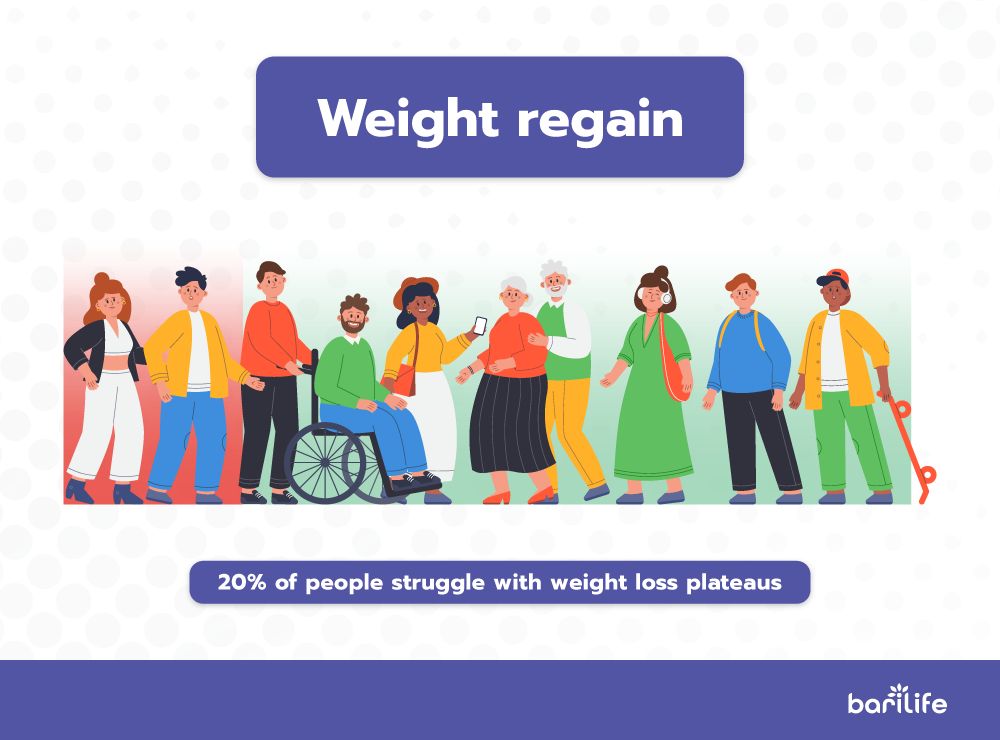
How to restart weight loss after gastric bypass
If weight loss stalls or you’ve regained some of the weight you initially lost after surgery, a great place to start is by looking at your diet. Another thing to consider is your daily activity. Have you become too relaxed with your diet? Are you exercising less?
If you’ve fallen off track, reverting back to your healthy eating habits and regular movement routine can help to restart weight loss. In order to lose weight, you must be in a caloric deficit. Simply put, you have to eat fewer calories than you burn. While there are psychological and behavioral factors that play into achieving this, weight-loss boils down to energy balance. It can be helpful to set a daily calorie goal and track your food to make sure you are at or below that amount.
Increased physical activity can help you achieve a caloric deficit as well. Aim for at least 150 minutes of moderate-intensity physical activity per week. Try to incorporate some resistance exercises at least 2 times per week to help maintain lean body mass.
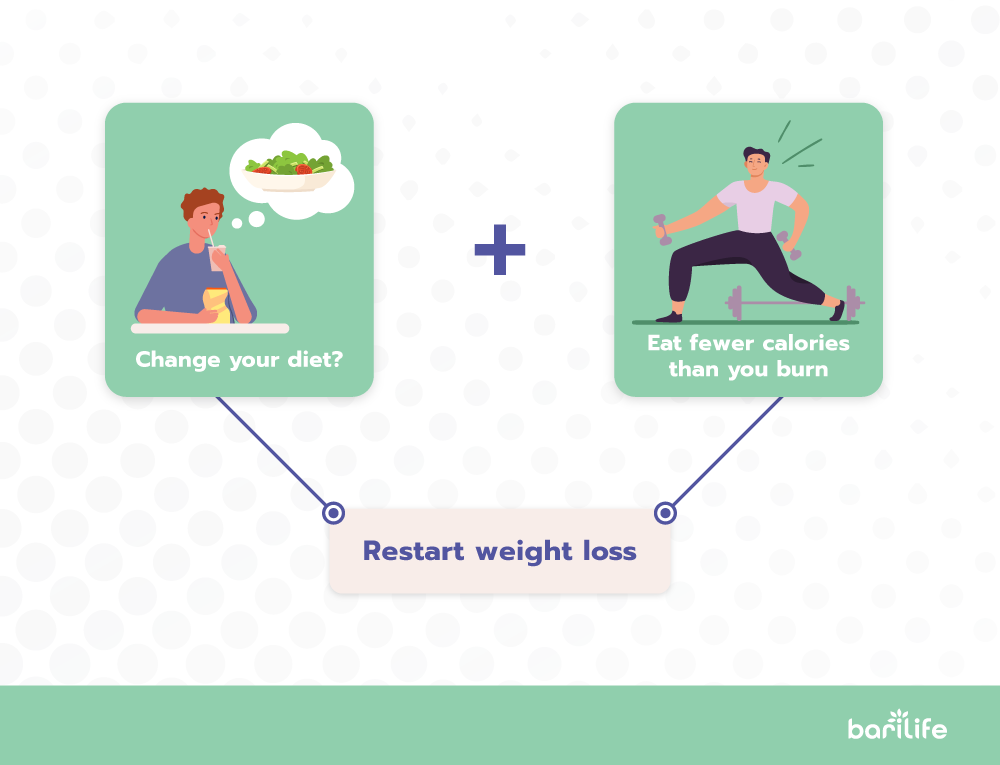
Conclusion
A gastric bypass weight loss chart can help keep you on track with your weight loss goals in the short and long term. Studies on gastric bypass weight loss outcomes have collected data to help determine how much weight you can expect to lose and in what time frame after gastric bypass. While these numbers are just estimates, they can be helpful in tracking your progress.
Don’t feel discouraged when weight loss slows or stalls. This is common and expected, and weight loss can be restarted with adherence to dietary recommendations and regular exercise. Ask your surgeon to help you set short and long-term weight loss goals for your gastric bypass surgery.




What are your tips and tricks to post-bariatric success?